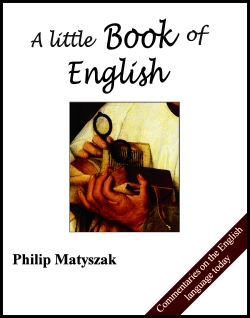|
The earlier Prof blog entries as well as some new articles are now available as a Kindle book from Amazon. We hope you enjoy it.

amazon.com amazon.co.uk
|
| 15 May 2023 | | He said ____ly | Fred stopped in the doorway. 'Can I come in?' he asked nervously.
Janet Smith, the librarian said reassuringly. 'Of course you can.'
'Take a seat' she added invitingly.
How does this extract from a student essay differ from professional writing? The first sign is adverb-itis. If a text is properly written there should be no need to explain the speaker's manner every time, or even most times. Likewise, if something appears within quotes then the readers already know that it has been said. You don't need to tell them.
Now let's rewrite this piece.
Fred stopped in the doorway. 'C-can I come in?'
The librarian looked up. 'Of course you can. Take a seat.'
Firstly, if Fred has been properly introduced, we should already know how he feels about entering the library. So just a small stutter is enough to indicate nervousness. Secondly at this point Fred would not know the name of the librarian, so there's no need to commit another amateur writer's error - that of unnecessarily introducing people. If Fred sees a librarian and we are seeing things from his perspective, all we need to know is that.
When the librarian says 'Of course you can' we assume this is said reassuringly unless the writer tells us otherwise. Likewise 'Take a seat' is an invitation, so we already know that it is said as such.
Note also that the first example of even this brief dialogue is a third longer than the second piece. Good writing is not necessarily brief, but there are no superfluous words. A good writer edits these out, whether in a classic novel or in an email to a friend. Whether professionals or not, we should all strive to follow the example of a writer who apologised to a friend 'Sorry this letter is so long. I didn't have time to make it shorter.' | | | | | 15 March 2023 | | Unusual etymologies | English is full of words which evolved from other meanings. To demonstrate this here are three examples.
Dumbbells. Everyone who has been to a gym has probably picked up one of these sets of weights. But why are they 'bells' and what makes them 'dumb'? Yet the reason is actually pretty logical. While the modern dumbbell has a circular weight at each end of a short metal bar, two hundred years ago, the design was slightly different. Rather than a circular shape, the weight was conical with the narrow part attached to the bar. This made it look rather like a hand-bell, except of course it did not ring when waved around. Being silent, this exercise 'bell' was a dumb bell, since 'dumb' literally means 'unable to speak'.
Potholes. Everyone has probably cursed these holes in the road that make a journey uncomfortable and wreak havoc with a car's suspension. Yet the problem goes back to the days before tarmacadam, when roads were surfaced with clay. This clay was irresistible for potters who were too poor or too thrifty to find their own clay. Instead they dug the material for their pots from the road – leaving behind 'pot holes'.
Shambles. Today this means any disorganized mess. Yet go back to the Middle Ages and you could go shopping at a shambles. This is because shambles were butchers stalls specializing in non-meat parts of an animal. Instead, kidneys, livers, hearts and entrails were spread over the stall waiting for the discerning customer. Because it was almost impossible to arrange that lot tidily, the goods on sale looked like, well, a shambles.
| | | | | 15 January 2023 | | Getting into the dictionary | The other day I was reading about a man whose arthritis was soothed by the motion of warm water in a bath which a relative has designed especially for him. Once it was realized that more people would enjoy the invention, Mr Jacuzzi became a household name. In this he joins an elite company of individuals who have become verbs or nouns (eponymous) in their own right, such as Pasteur who taught us to pasteurize milk, the mesmerizing Dr Mesmer, the sadistic De Sade and his counterpart the masochistic Leopold von Sacher-Masoch.
One way to become a dictionary entry is to have a discovery that takes your name – as Messrs Guillotine, Braille and Mercedes have discovered. In which category we have to give a special mention to Adolphe Sax, since everyone knows the saxophone but have forgotten the inventor. The discovery need not be an invention – as Dr Alois Alzheimer can testify. The novel sanctions proposed by Captain Boycott are another example.
Ancient myth has also added some people to our vocabulary, such as Hector who hectored his brother Paris for his poor performance in the siege of Troy, in which the Greeks were mentored by, well, Mentor. This tradition has come down to the present day when an experiment with unpleasant side effects is a 'Frankenstein' and an improvised tool is McGyvered.
Let's finish with a few others who should join the roll of honour, such as Plato who gave us Platonic friendships, Freud whose Freudian slip has er, slipped into the language. Chauvin whose chauvinism is now more gender-based than nationalistic, and Jean Nicot who shipped tobacco plants to Europe and gave us nicotine. Finally E. Gerry governor of Massachusetts, who helped his political fortunes by creating a convoluted electoral district that resembled a salamander. The result was called a 'gerrymander' and has since become a hallowed political tradition in America (which continent is named after the explorer Amerigo Vespucci). | | | | | 15 November 2022 | | Let's call her 'Manchester' | You might have noticed that there's a lot of toponymic nomenclature about these days. That's the fashion for naming people after bits of geography. Though doing so has become more fashionable lately the idea is certainly not new. Many people have surnames that come from places – people called Livingstone, Drummond and Murray, for example all come from places in Scotland.
Some names that started as toponymic surnames have long become first names - Douglas being an example. Others are more recent. Indiana Jones was not the first character to be named after a US state, and non-fictional examples abound, such as the Dakota Joshua now playing in the NHL. (National Hockey League). Again this is not particularly modern, as writer Tennessee Williams will attest. This is less done with United Kingdom counties (Lancashire Smith, anyone?), though Devon is reasonably common. There are also Devon Shaws about, reminding us of that county's beautiful beaches.
Some names start as first names, become place names and then have people named after the place. Austin and Dallas in Texas are examples, as are Georgia and Virginia (two more US states often used as first names, as is Alberta, a province of Canada originally named after a daughter of Queen Victoria).
A lot of women and girls now carry city toponyms in their birth certificate, Siena being a common example. Florence Nightingale might have started the trend, being born in Florence in 1820. Sidney is getting more popular as a girl's name, and now Alexandria has generally replaced Alexandra as the feminine of the name. (One notes that left-wing politician and feminist icon Alexandria Ocasio-Cortez has that first name, which translates as 'Defender of Men'). Nor should we forget celeb Paris Hilton, especially as there are three Hilton Hotels in Paris.
Nevertheless, the prize for a toponymic first name remains with writer and poet Rudyard Kipling who was conceived on the banks of the eponymous British lake. | | | | | 15 September 2022 | | Excuses, Excuses | One problem that English-speakers have with the English is that they often don't speak the same language. Bump into an Englishman on the London Underground, and he is likely to say 'Sorry' or 'Excuse me'. A foreigner might naively think that the nice English person is apologising for getting in the way while the Englishman believes that he has just said 'Watch where you are going, you damn fool.'
In fact when an English person says 'Excuse me', especially when not saying what they want to be excused for, it is a good idea to listen for stress on the second syllable. The more the '..cuse' part is stressed, the less the speaker actually wants to be excused. Another giveaway is if the 'Excuse me' is followed with the word 'but ..'. So a sentence such as 'Excuse me, but is that a good idea?' actually translates into non-English English as 'Seriously? What kind of idiot are you?' The words 'Excuse me, but I think that is my seat' are not so much a polite opinion as a declaration of war.
Again, when an Englishman says 'Excuse me' and assumes an air of careful attention, he probably has not misheard what you have just said. Instead you are getting the chance to review those words and work out why they might cause a major problem. For example if you say to your English boss, 'I may be able to get those reports to you next month', his polite 'Excuse me?' is your signal to say 'I meant by the end of next week, Sir!'
One result of this is that when an English person has really not heard what you have said, they have to say so. As in 'Excuse me, I didn't catch that. It is so loud in here.'
The use of 'Excuse me' in this way has crossed the Atlantic where you might hear an American responding to criticism with something like 'Well, excuse me if I am not perfect', or 'Excuse me for being alive.' Your average Englishman avoids such blatant passive-aggression. The proper English response to a similar criticism is a slowly-drawled 'Well do please excuse me' uttered in tones of deep disgust. | | | |
page 1 page 2 page 3 page 4 page 5 page 6 page 7 page 8 page 9 page 10 page 11 page 12 page 13 page 14 page 15 page 16 page 17 |
|
|

